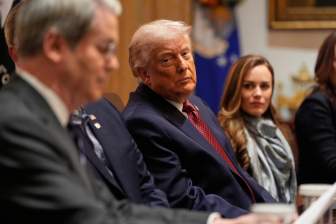British Columbia Premier David Eby hinted he could be open to a bilateral health funding deal with the federal government, provided Ottawa is first willing to sign on to a “base” funding deal with the provinces.

Eby made the comments Wednesday, after Prime Minister Justin Trudeau said he’d invited premiers to a Feb. 7 “working meeting” in Ottawa to hammer out a health-care deal.
Canada’s premiers have been seeking an across-the-board, no-strings-attached increase to the Canada Health Transfer, while the Liberal government has signaled it wants bilateral deals with the provinces that could tailor funding increases to regional needs.

“As I understand it the proposal’s around two badly needed discussions: one is around the base funding for health care that all provinces need universally, but the second is bilateral agreements with the provinces around — each province has its own distinct health issues that we’re facing, and we need to have those unique agreements with Ottawa around those priorities, those areas of strain we’re feeling,” Eby said.
“My hope is we come out of the meeting on the 7th with an agreement about the base and a commitment and a path towards those bilateral discussions we have to have on our provincial priorities here in B.C.”

Get weekly health news
Trudeau announced the planned meeting during a news conference Wednesday morning in Hamilton, where the Liberal cabinet was finishing a three-day retreat ahead of the return of Parliament next week.
He said he was eager to negotiate with the premiers, but that no one should expect a deal to get done the day of the meeting.
“It’ll be about starting the very direct hard work of the bilateral arrangements that will happen with every province, while at the same time moving forward with a frame around data, health information and results that I think every Canadian wants to see,” Trudeau said.
Eby also appeared to suggest openness to working on data collection issues with Ottawa, saying the province saw its focus on data-informed decision-making “really explode” during the COVID-19 pandemic.

He said Ottawa’s approach looked “very consistent with where we are going anyway,” but that details would need to be negotiated at the table.
Canada’s 13 premiers have been united in their call for a boost to the health transfer, and are seeking an increase of the federal contribution towards health costs from the current 22 per cent to 35 per cent.
Health care now amounts to more than a third of provincial budgets, and while several provinces — including B.C. — have posted recent surpluses, they say Ottawa needs to shoulder more of the burden.
Deputy Prime Minister and Finance Minister Chrystia Freeland and Health Minister Jean-Yves Duclos both pointed to the province’s strong financial position earlier this week.
However, Eby said recent badly-needed B.C. initiatives on health care, including a new funding deal with doctors, work to recognize internationally trained doctors and nurses credentials and a planned new medical school, have only increased pressure on B.C.’s budget.
“Those initiatives cost money. And the province in prioritizing and ensuring that British Columbians get the care they need, that means there’s less money available for other essential programs, education, roads and transit, conservation and parks,” he said.
Working out a deal with Ottawa would also help fend off entrepreneurs seeking ways to introduce privatized elements to the system.
“I’m really hopeful we’ll be able to reach an agreement in Ottawa,” he said.
“It has been my belief and the belief of all the premiers for the provinces and territories that if we just get around a table together and talk it through we’ll be able to get a deal, and that’s what we’re set up for.”
Trudeau has said he’s willing to make long-term, multi-year health funding commitments to the provinces, if they agree to a shared set of priorities with “tangible results” in areas including cutting backlogs, supporting health workers, improving access to family doctors and mental health services and the sharing of health data.
– with files from Global News’ Teresa Wright and The Canadian Press








Comments